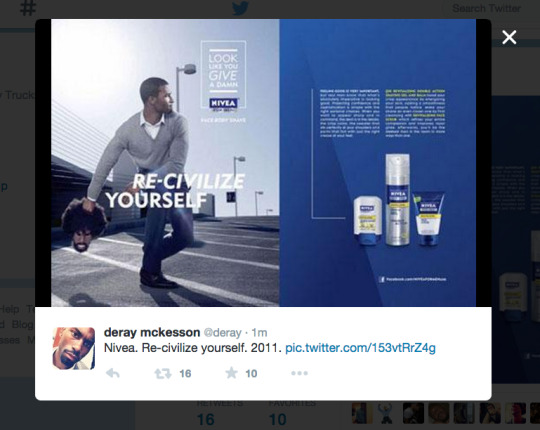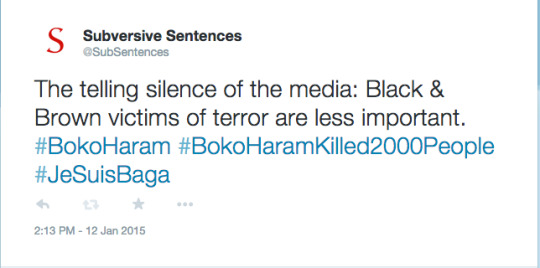Link
This is my latest: If you don’t know, you can now follow me at bodega_gyro_ao on twitter.
1 note
·
View note
Text
Strange Times in Greece: From Syntagma to Syriza and Back Again
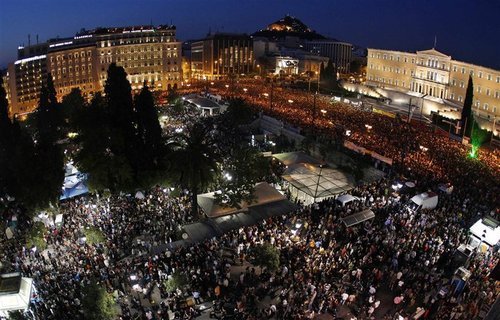
What was a movement became a party and got elected to power.
These are indeed strange times in Greece. The land that birthed the word democracy also produced the word tyranny. With the election of Syriza, the Radical Coalition of the Left, the Greek people stand poised to pit those ancient foes against one another, in a battle that will have tremendous consequences for the people of the small republic and others throughout economically-troubled southern Europe.
Five years ago, in May of 2010, a protest movement took Syntagma Square in Athens. In modern Greek, Syntagma is translated as “constitution,” but in Ancient Greek it means “to arrange together.” And so, in this aptly-named place, a constellation of unionists, leftists, communists, anarchists, and students responded to many factors, but most immediately to cuts in social expenditures and tax increases, by taking to the streets. The world took notice.
Protests continued in Athens, Thessaloniki, and other cities. A year later the movement, now referred to as the Indignants at Syntagma, established general assemblies. As Germany’s Angela Merkel called on Greece to tighten the fiscal screws in return for renewed loan terms, the protests grew, as did violent repression. The activists called for corrupt politicians to be charged, refusal of odious debt, and a new constitution. The Indignants’ demands were not met, but they launched inequality, corruption, and anti-austerity into the public discourse. Tremendous marches lent a sense of credibility to the movement; estimates of attendance at these public displays ranged from 100,000 to 500,000.
Despite public pressure to reject austerity and excitement surrounding a scheduled referendum, the Papandreou government of PASOK (socialists in name alone) stood down and the so-called bailouts were accepted. The referendum was cancelled and Greece would be driven into a period of austerity. The neoconservative Samaras government of New Democracy, would continue dosing the Greek nation with the Troika’s prescription of debt payments, increased taxation, and extreme decreases in social spending.
The tyranny of neoliberal capitalism and austerity ravaged the tiny Mediterranean country of Greece against the democratic will of the people. Social and human rights costs have been high, the country’s healthcare system gutted, public lands stripped, and utilities and services privatized. In recent years, youth unemployment soared to 50% and poverty has hit a critical threshold, devastating the lives of much of the populace.
As social safety nets fell, Greeks relied on community and family to keep them from absolute destitution. Many were unfortunate, and suicide rates skyrocketed. None was more traumatic to the national psyche than that of Dimitris Christoulas, a 77-year-old retired pharmacist and fixture at the rallies, who took to Syntagma Square and shot himself in the head. His suicide note lamented, “I see no other solution than this dignified end to my life, so I don’t find myself fishing through garbage cans for my sustenance. I believe that young people with no future, will one day take up arms and hang the traitors of this country at Syntagma square, just like the Italians did to Mussolini in 1945.″
Syriza became electable because of circumstances like these. New Democracy may have been in power these last four years, but it was the centrist PASOK government that cancelled a referendum on the bailout, a referendum which polls showed would go decisively in the favor of rejecting the bailout terms.
When the 2015 elections arrived, Syriza, a party born out of the discontent in Syntagma, ascended to the government of Greece with a strong but not dominant mandate. Their victory has been met with extreme optimism in some circles and outright hysteria in others.
When it comes to governance, it would be an understatement to say things are complicated for Syriza. Falling two seats short in the election of a complete majority and spurned by the orthodox and principled communist party, KKE, Syriza had to turn elsewhere to form a coalition government.
To the utter dismay of many in their base, they came to terms with ANEL (Greek Independents), a party of extreme conservativism. Many of its members are originally from the party of the outgoing government. They disagree with Syriza about everything with the exception of the need to do away with Austerity. Kammenos, the party leader, recently named Defence Minister, is known as a hawkish nationalist with strong ties to the Greek oligarchy. His openly racist and homophobic stance are troubling to Syriza’s base and spell a capitulation on their progressive stance on issues like rights for same-sex couples and the demilitarization of the police.
What does this willingness to compromise with ideological opposites tell us about Syriza?
It tells us that Syriza obviously places repudiating austerity as a priority. While formed of composites from other Leftist parties, Syriza is not a homogenous party of class struggle, it appears to be the party of anti-Austerity. What started as a party of social movement is today a party of government.
On the financial side of things, Syriza has been very clear. They’ve backed away from leaving the EU and as now-Prime Minister Tsipras and recently named Finance Minister Varoufakis have explained, they intend to drastically negotiate the terms of the debt, to return the minimum wage to pre-crisis levels, and to stop the privatization of utilities and public land.
Varoufakis, the economics professor turned finance minister, has been an ardent critic of austerity, the European Union and power-wielding, tax-dodging Greek oligarchs for years. He recently referred to the debt peonage and austerity measures as “fiscal waterboarding.”
For those far to the left, this is quite a disappointment as it departs from Syriza’s rhetoric of two years ago, which was a more radical agenda to expunge the debt and leave the EU. Still, facing Greece’s creditors, negotiating the debt and remaining in the EU will be no easy feat.
The Troika, fearing the implications that even partial debt forgiveness would have on other indebted countries, has expressed great disapproval of any renegotiations, even as austerity crushes the Greek people.
In Syriza’s arsenal of economists, Varoufakis may be the most prestigious, but not the most radical. He’s a trained economist, an expert on game-theory, a self-proclaimed Marxist Libertarian and a former advisor-turned-critic of the Papandreou government that led Greece into the so-called bailout. In addition to challenging the Troika, Varoufakis intends to take on the Greek oligarchs, in a television interview he recently said “we are going to destroy the basis upon which they have built for decade after decade a system and network which viciously sucks the energy and economic power from everyone else in society.”
With the government’s economic and financial stance clear, what are we to make of Syriza on the social front? What of the immigrants dying in the streets at the hands of nationalist thugs? What of the gay rights promised by Syriza? What of demilitarization? In keeping with the platform, Tsipras appointed a cabinet of academics and “human rights advocates.” But the coalition with ANEL will put a strain on these commitments. If Syriza cannot deliver on these issues, what is one to make of all the promises jeopardized by the capitulation to conservatives? These too are pressing questions.
Orthodox communists will bemoan Syriza and Tsipras; to many he is already a champagne socialist. Conservatives and reactionaries have already began ridiculing the party’s hopes as Leftist pipe-dreams.
Syriza now has to govern, they are the party of government — not of revolution. The euphoria of the election was quickly tempered by the pragmatism of governance and the task at hand. They have yet to propose anything radical, instead they talk of minimum wage, eased debt payments, and social programs. These are important programs that may improve social conditions for many in Greece. There is no program of mass nationalizations or land appropriations. If one is looking for a party that will sweep away the state into a classless society, he is looking in the wrong place.
In forming a coalition with ANEL, Tsipras is perhaps hearkening the advice of J.K. Galbraith when he told President Kennedy, “(p)olitics is not the art of the possible. It consists in choosing between the disastrous and the unpalatable.” Tsipras must determine if governance is more palatable than principle.
To forego the unpalatable, to take any kind of leap to the possible, Syriza needs to display a stronger mandate than it earned in the elections.
Here it’s instructive that the Greeks remember their history. They last faced tyranny during the period of the military junta of 1967-1974. It was the student-led uprising at Athens Polytechnic that notably defied the dictatorship. The uprising was not itself successful at restoring democracy, but many believe it precipitated the falling of the dictatorship nine months later.
We return now to the beginning. What Syriza, and more importantly Greece, needs is the continuation of social movements. What Greece and maybe Europe needs is Syntagma.
photocredit: Kotsolis at English Wikipedia
Previously published in CounterPunch.
#syriza#syntagma#greece#hellas#tsipras#yanis varoufakis#ekloges2015#Social Movements#austerity#Eurozone
6 notes
·
View notes
Text
Jessie Hernandez, 17, Queer, Gunned Down In Denver, Driving Allegedly Stolen Car
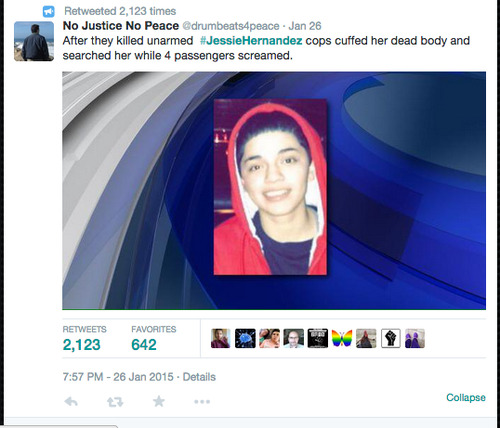
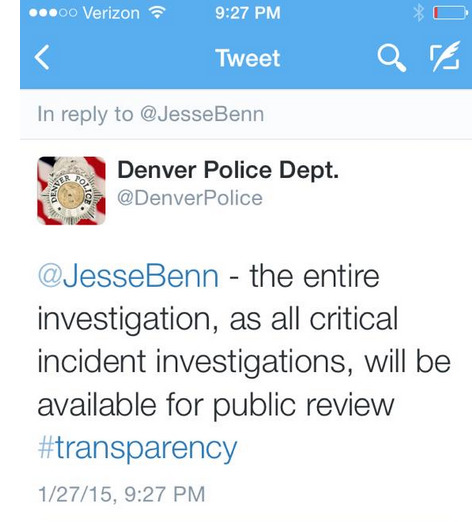
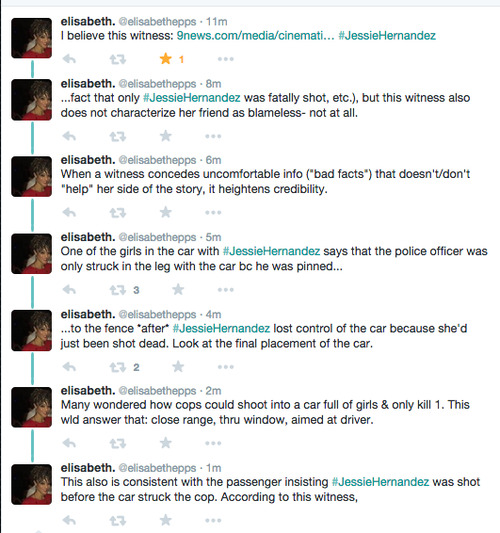
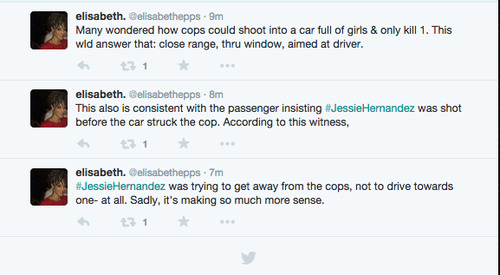
22 notes
·
View notes
Photo
socialjusticekoolaid, as a latin@ blogger, I feel the solidarity inherent in our usage of POC belongs to marginalized communities of color and should be avoided by non-POC. When referring to specific individuals, I don't think we should use POC as it does then perpetuate erasure of context.


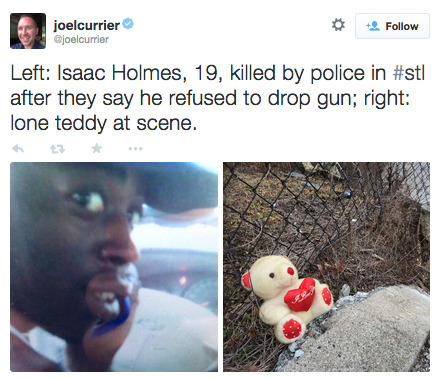
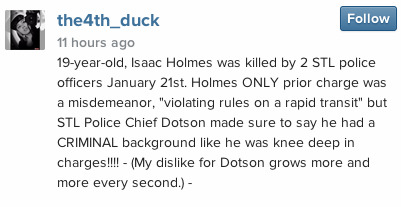
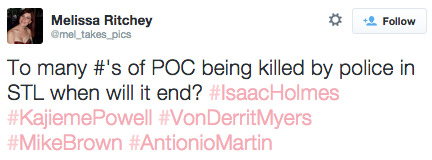
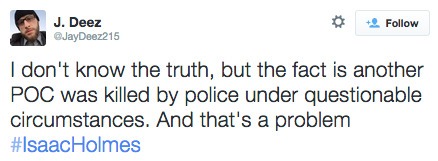
#Every28Hours (1/23/15): Another young Black man has been extrajudicially killed by the police in St Louis. For all the stories I’ve seen of crazed gunman, armed-robbers, and murderers who are taken into custody, why does it seem like the only time cops forget how to use non-lethal force is with a Black kid. #staywoke #farfromover
42K notes
·
View notes
Photo
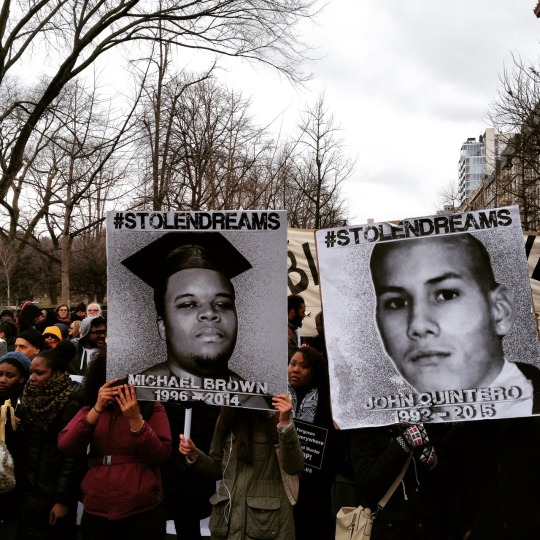
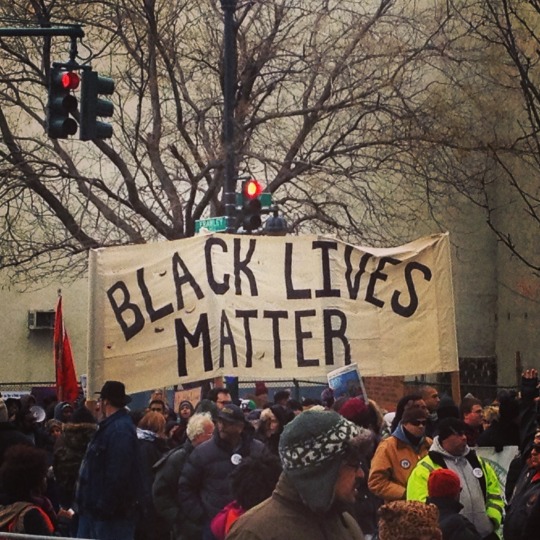
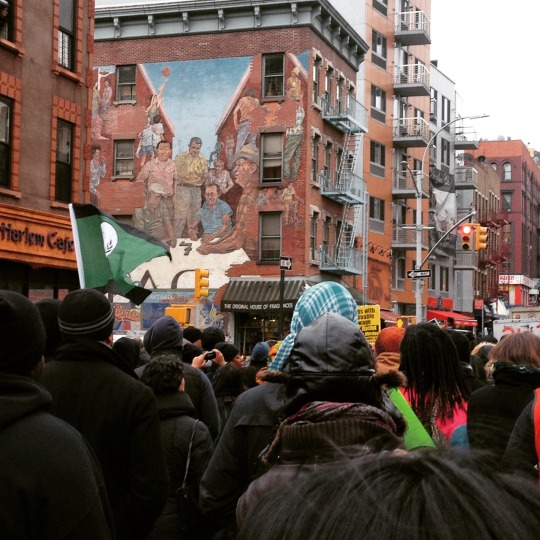
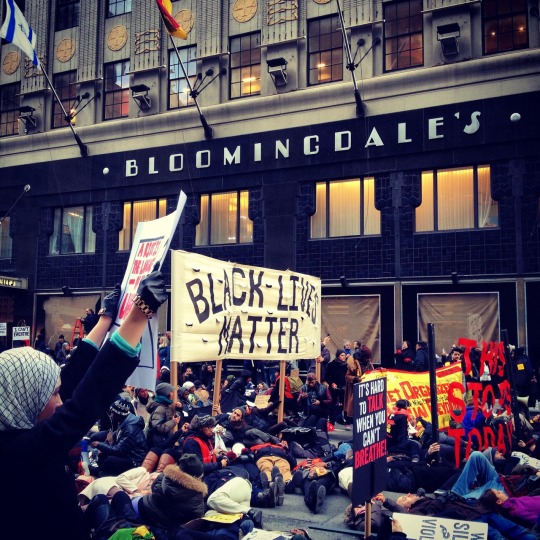
MLK Day NYC 2015
11 notes
·
View notes
Text
The Labyrinth of Race: Why We Must Continue The Uncomfortable Conversations
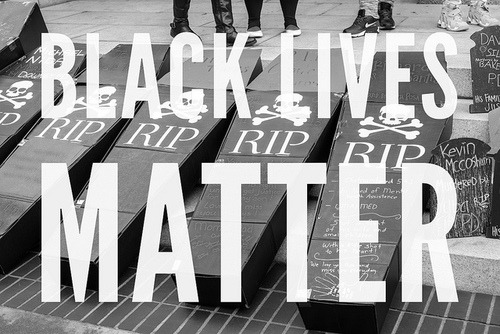
Race is the labyrinth of despair – it is where the American Empire hides the bodies from which it literally and figuratively has extracted its entire existence into being. Race is a construct for punishment and power.
For much of America, race no longer exists, and so the labyrinth has become invisible. Gone are the days that it needed the pretext of race to justify slavery and Jim Crow. Instead, the absence of race is itself racist seduction, a fantasy through which white America discharges itself of its inherited privilege. Unaware and immune to the past and present atrocities, most people can continue about their business as if race doesn’t matter.
For racialized Americans the corridors of race are real and familiar. We can retrace the steps and speak of them. Make no mistake – the labyrinth is not a comfortable place; it is a place where one is apart from oneself. It is an identity burdened on us: Black, Latino, Indigenous, Asian, Arab, etc. All the while, America continues along, seduced by the myth of a post-racial society. This is precisely why we must maintain and increase the level of dialogue on the subject of race, no matter how much the rest of America tries to stifle the conversation.
The only way forward is backward; we must make America face the labyrinth.
If you’ve managed to miss the last 500 years of history, racism of the white supremacy variety exists and it has devastating, shattering, and demoralizing consequences for racialized communities. The modern concept of race is indeed an American one, born of slavery and colonization. The implications of race in the structures of our society are very real; they were explicit in the foundation of this country, they are the language of the operating system and so they are observable in the output. We can discuss racial inequality in tangible and empirical language. I won’t waste time arguing or proving the point. Here are a few reputable studies that do the job: on job market discrimination, on targeting Blacks in the “War on Drugs”, on educational inequality, on racism and healthcare.
So why the denial? Aside from the obvious answer, “white America benefits from it,” the most significant power in the arsenal of white privilege is the ability to evade race itself, to be an individual. It isn’t that white America doesn’t know that race exists, of course it does, primarily through Black history month, music videos, and small subsets of friends and coworkers. But white America has the special privilege of being optimistic about race. White privilege doesn’t immunize people from difficult lives: they can be poor, exploited, abused, or murdered -- any number of difficulties can befall them. But race and its immense burden eludes them. White America sees the footage of the Civil Rights Movement, the legislation of the 1960s, the establishment of affirmative action, the rise of successful people of color, they misinterpret these to mean the end of racism. These convictions contribute to their sanguinity on issues of race.
Those who do not believe in the oppressive force of race in society are likely to dismiss personal anecdotes of racial disadvantage as anomalous. Too often, we hear this dismissal in the form of the refrain “but things are getting better” or the vexed “I didn’t have it easy!” In an economic system that fosters extreme income inequality, it is difficult for working-class white people to accept that there are structures in place from which they exclusively benefit. This notion often makes them outright resentful.
Shifting public perception and social norms have left less room for openly vitriolic hate speech. Today, most decent people (many of whom may be racist and not know it) awkwardly avoid racist language, replacing epithets with euphemisms, genuinely believing that racism is no longer a major issue. What they do not see is that racism is embedded in the political, economic, judicial and social structures of American society. It cannot be totally undone by changes of heart; understanding and tolerance can go but so far. Even the most well-meaning anti-racist, if he or she denies this reality, paralyzes any opportunity for change.
The problem of racism is both structural and cultural. The solution will be both. Racism must be confronted with relentless fervor. White America has only been asked to do that a number of times in its history, usually in the aftermath of historic turning points such as the 13th Amendment, the Watts Riots, and Ferguson to name a few, but never perpetually.
So we must continue to bring race to the fore. If it makes white people uncomfortable, so be it. Racialized people unfortunately understand this discomfort all too well. We must diagnose, expose, and unravel racism in all the structures of society. We must bring America down the labyrinth, to face the beast.
( photocredit: Rachel Towne/ http://goo.gl/PFiyXa )
#blacklivesmatter#racism#race in america#white privilege#White Supremacy#civil rights#Mike Brown#eric garner#POC#mlkday
2 notes
·
View notes
Photo


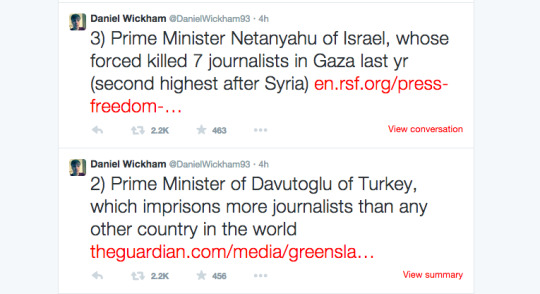

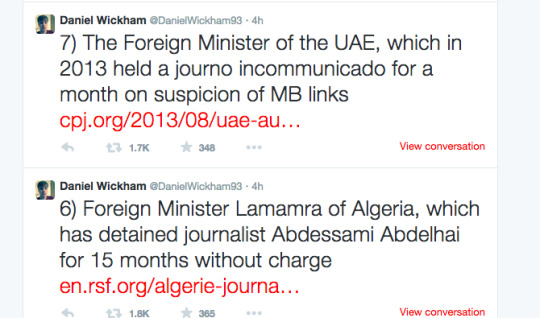


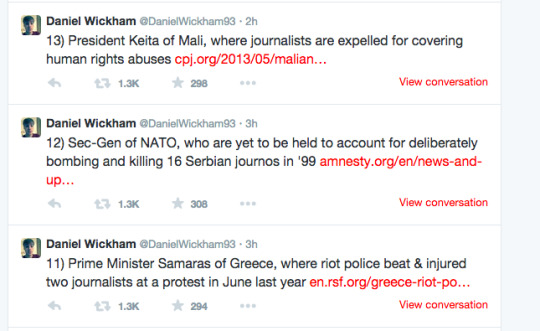
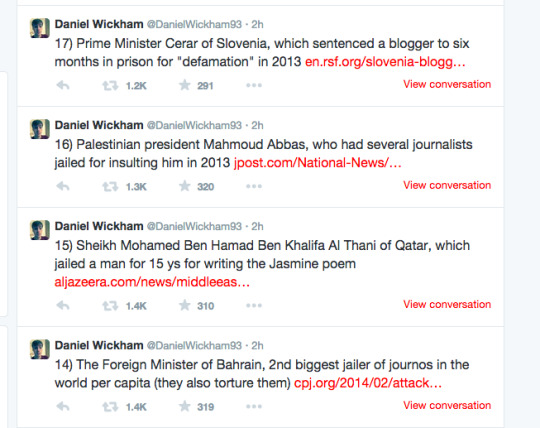

Hypocrisy.
181 notes
·
View notes
Photo



What do we mean when we say "freedom of speech"?
full article here: http://www.worldbulletin.net/world/152585/charlie-hebdo-fired-cartoonist-for-anti-semitism-in-2009
#charlie hebdo#jesuisahmed#jesuischarlie#freedom of speech#political cartoon#islamphobia#antisemitism
1 note
·
View note
Text
Beyond Barbarian: How We Talk About Terrorism
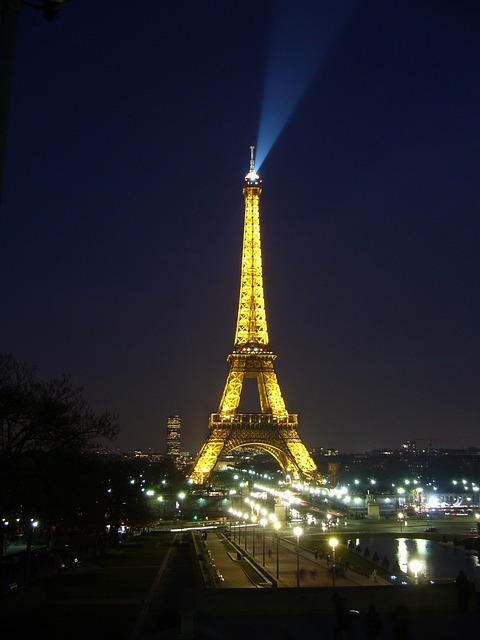
This weeks attacks at the Charlie Hebdo offices in Paris have justly sparked a lot of public discussion about terrorism. Unfortunately, most of it has been trite, relying on the old narrative of barbarians at the gates of civilization.
The proverbial “they” are the terrorists, constructed in the collective imagination out of fear, ignorance, and gullibility. “They” hate our perceived freedoms. Our movies have been saturated with images of them: brown-skinned men and women attacking our way of life. Tabloids prominently display their faces alongside images of carnage. Such an understanding lacks nuance and ignores historical, social, and cultural context -- it creates a caricature of culture that constructs a monolith of Otherness that must be destroyed at all costs in order to preserve Western liberalism.
We in the West live with an inflated sense of our importance and with a mythological understanding of our society. In the United States, this myth takes the form of American Exceptionalism. It’s the same myth that Reagan perpetuated when he paraphrased the Puritan leader John Winthrop, invoking the “shining city on a hill.” It’s this belief that was echoed by American diplomat Richard Guenther and later quoted by Teddy Roosevelt when he proclaimed “We will fight for America whenever necessary. America, first, last, and all the time. America against Germany, America against the world; America, right or wrong; always America.”
The European face of cultural superiority is not very different. In a telling post-9/11 quote, then Italian Prime Minister, Silvio Berlusconi said “We should be conscious of the superiority of our civilization, which consists of a value system that has given people widespread prosperity in those countries that embrace it, and guarantees respect for human rights and religion. This respect certainly does not exist in the Islamic countries.” It is this same sense of cultural superiority that Winston Churchill betrayed when discussing the Palestinian issue, “I do not admit that the dog in the manger has the final right to the manger, even though he may have lain there for a very long time…I do not admit, for instance, that a great wrong has been done to the Red Indians of America, or the black people of Australia…I do not think the Red Indians had any right to say, ‘The American Continent belongs to us and we are not going to have any of these European settlers coming in here’. They had not the right, nor had they the power.”
So pervasive is this myth that it infects all facets of our culture. Westerners trace their political fantasies to Athens and Rome, fetishizing democracy and republics that were inherently flawed, corrupt, and unequal. More important than who the West identifies as its cultural ancestors, is who or what the West denies. The West is not, in its eyes, barbarous, savage, and cruel. The West is not corrupt, dictatorial, and problematic. The West is justice and all those who oppose it are the purveyors of evil and injustice. Instances that say otherwise, are mere aberrations in our history, not symptoms of our inherent cultural defects. It was Western culture that birthed the Nazi party, it was Western culture that birthed the Spanish inquisition, it was Western culture that both developed and used nuclear warfare. At a point, the weight of all these aberrations becomes too great; there are simply too many Wounded Knees, too many internment camps, too many My Lai massacres, too much slavery, too many secret medical tests on Black people, too many Hiroshimas (it takes a kind of savagery of the soul to eradicate a people without even looking at them), too many drones in the sky, too many Fergusons, too many Eric Garners, too much torture.
The West is more than the United States. Our notions of France are archetypal of our ideas of Westernism. Paris is the “City of Light” and we claim the French Enlightenment ushered in a new era in human history that emphasized reason over traditional, light over dark. The slogan of the French Revolution translates to liberty, equality, and fraternity - a three word summary of what we imagine the West to stand for.
Yet, it was the French who colonized much of North Africa, namely Algeria and Tunisia. The colonized were oppressed both in their native lands and as immigrants in France. France’s history in Africa, rife with racism, is especially problematic. The French referred to the colonized who took on French customs as “evolved,” implying an empirical superiority over native culture. During the Algerian War of Independence, an uncounted number of Algerian Muslim protesters were massacred by the police in the streets of Paris.
When the scales of justice are weighed down with these so-called aberrations, justice, like a house of cards, falls over, an aberration unto itself.
America and the West is not devoid of problems, we are hardly exceptional in that way.
When a terrorist attacks a civilian or government target in a Western country, the discourse varies based on the attacker. If the attacker is obviously Muslim, the agent is labeled an Islamic terrorist. If the attacker is a white Westerner, he is deranged and irrational. One is a product of his society, the other is not. This essentialist dichotomy is precisely the reason the media was slow to label the Tsarnaev brothers attack in Boston, so much so that they threw one of the brothers on the cover of Rolling Stone magazine.
But when either terrorism is discussed, societal, economic and political context is dismissed. The personal context of the white American terrorist is magnified - he is a deranged man, a disturbed lone wolf acting outside the bounds of his society. The Muslim is essentialized as culturally-predisposed to terror by a violent faith, acting in accordance with the nature of his society.

Think on Timothy McVeigh, the man convicted and executed for the Oklahoma City bombing in 1995: he was portrayed as alienated, insane, and fundamentally evil. The social and material conditions that produce McVeighs are rarely explored; rather, psychological defects are cited as the root cause of their malice. We have had similar homegrown American terrorists. We have had Ted Kaczynski the Unabomber, a Harvard-educated mathematician who wrote scathing critiques of modern industrial society. We have had the shooters: James Holmes in Aurora; Michael Page, the Army Veteran responsible for the Sikh temple shooting; Jared Loughner the Tucson, Arizona shooter; and Steven Kazmierczak, who killed 27 people in a Northern Illinois University lecture hall. These are just a few of the many. Between 1982 and 2012, there have been at least 62 mass shootings in the United States. Most of these acts were meant to send a political or social message.
Is it something about our society or culture that produced these killers? Are they anomalies or are they representative of something ubiquitous?
Simultaneously, there are no close studies of the Muslim individuals who perpetrate acts of terror. Their upbringings are not dissected nor are their conditions examined; instead they are painted with a broad brush. Their childhood friends are not interviewed, elaborate psychological profiles are not publicly discussed. The motives are reduced to one word: Islam.
If the target of both kinds of terrorists is the Western power structure, in the eyes of the media, the West is a priori exonerated without scrutiny. No reasonable person would blame the terror on people shopping in a Parisian kosher market or those working in the Twin Towers. Clearly, the victims of terror are innocent.
Our current discussions on terrorism are inadequate. They are largely racist, serving to further the political and economic interests of the Western power structures while doing nothing to create a world in which we can live alongside one another.
Responsible discourse lies not in dismissing these actions as the products of either psychosis or an evil, inferior culture. It begins with self reflection-- in unraveling our myths about others and ourselves.
#terrorism#war on terror#jesuischarlie#jesuisahmed#islamphobia#charlie hebdo#paris attack#politics#orientalism
5 notes
·
View notes
Text
Why I Cannot Be Charlie: The Freedom To Exist

On January 7th 2015, three gunmen entered the offices of Charlie Hebdo, a French satirical magazine, and opened fire, killing 12 people and injuring 11 more. The assailants targeted the magazine, particularly its cartoonists, as retribution for cartoons and artwork that they deemed offensive to Islam. Entering the office, they identified their targets and unleashed a barrage of bullets.
The subsequent public reaction to the attack has been of understandable horror. As expected, right wing news outlets relied on the simplistic narrative of Islam as a religion of terror. Social media quickly erupted to denounce the attacks; #JeSuisCharlie became a trending topic on Twitter, Tumblr, and Facebook.
The sentiments behind this hashtag are noble and reasonable, as lives were taken and freedom of speech was assaulted. Journalists, actors, government officials, and religious leaders the world over have shown solidarity.
French President Francois Hollande described the attack as one "of exceptional barbarity," while the US President called the attacks “cowardly” and “evil.”
But I cannot #JeSuisCharlie. Not because I don’t condemn the ghastly murders. I do. Not because I don’t believe in freedom of speech. I believe it is the bedrock of a truly free and civil society. I cannot for other, larger, reasons.
I cannot #JeSuisCharlie because attacks of this nature are not commonplace in the West, yet they have been part of a dark and ugly reality in much of what we broadly call the Muslim world for years.
Where is our hashtag for that?
In Pakistan alone, over a thousand civilians are killed by terrorism every year. The numbers have almost steadily escalated every year since the so-called War on Terror began, with about 140 fatalities in 2003 and almost 1800 in 2014. In 2013, an especially brutal year, the number of civilian fatalities was around 3000. But the terror doesn’t come from Al-Qaeda and like groups only. A lot of it comes from us.
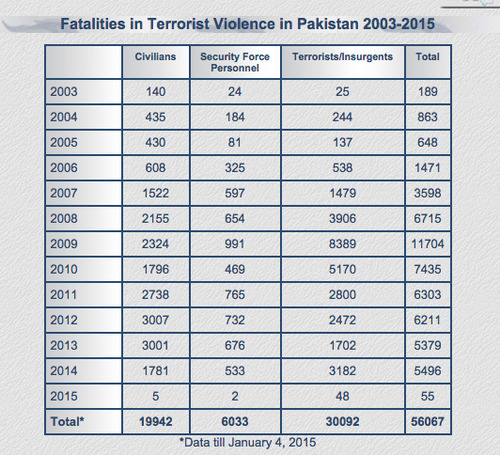
(table from Institute For Conflict Management)
Where is our hashtag when the United States blows up a wedding convoy or a 16-year-old American-born teenager in Yemen? When it launches a missile into Momina Bibi, a 67-year-old Pakistani grandmother going about her gardening? They stood for something greater than freedom of expression: the freedom to exist.

I cannot #JeSuisCharlie, because we've always mourned the deaths of Europeans and Americans. We've purported to launch wars for them. But if we value lives, then where is our indignation for deaths in the Muslim world?
Statistically speaking, a terror attack will kill a few Pakistanis this week. A drone strike is likely to kill a civilian in Pakistan, Yemen, or Somalia soon.
Where are their hashtags?
1 note
·
View note
Quote
Cultural appropriation karma = White guys from England appropriate Black music. Become world famous! White people associate rock music with white guys. The Beatles! The Beatles! Paul McCartney of aforementioned group records song with Kanye West, a Black hip hop artist. White people's grandkids don't know who Paul McCartney is.
1 note
·
View note
Photo

Distributing these as stocking stuffers.
0 notes
Video
youtube
Poem for the People - Mr Jeff Dess
0 notes
